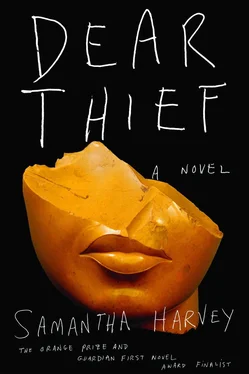Sitting in what would soon become the red room with the fire lit and our 40 or 50 or sometimes 60mg, while my parents were away for their long stints in India escaping the winter. We played hand after hand of Poker, 21, Gin Rummy, All Fives. These were not games but little parlays with fate; I remember the feeling that each card turned was a renewal of luck, that I could continually play myself out of dead-ends and misfortune, like flinging open a series of gates until one led to the great reward, the ultimate boon. We were surrounded, in the red room, by a sense of divine bounty, something mighty to aim at; so it was with this room. An intoxicating place. It was lined with shelves of religious texts — Christian, Jewish, Roman Catholic, Islamic, Buddhist, Hindu: my mother and father could not limit themselves to a single doctrine, they saw the mysticism of faith divide and emblazon itself like a firework, from the books of the Apocrypha to the Hindu moksha, in one explosive rejoicing. And you, marooned in the wet Welsh Borders, rising from our card games erratic and euphoric and irrepressible, plucked books from the shelves, sifted through creeds and, like some creature trying to shake itself dry of the swamp, settled on the Upanishads.
Brava! These raw songs of Hindu philosophy suddenly in your hands. Sitting once more, as we had as children, on the floor by the fire with your elbows on your raised knees, your top half slung forward, crescent-backed in the pose your mother always said would cripple you. Reading: If everything is in man’s body, every being, every desire, what remains when old age comes, when decay begins, when the body falls? You would turn the two hooped earrings through your left ear in a full rotation as you read, until the lobes flushed crimson.
Cooking haphazard creations; you liked meat. We once tried to kill a rabbit in the garden but we couldn’t catch it, and when one of your stones did find its target the poor creature turned a gaze on us that dissolved our appetites — such offended surprise, as if it had expected more of us, and then a moment of cold scrutiny that appraised our souls, and then terror and flight. Let us never do that again, I said, and expected you to dismiss me as sentimental. But you nodded, a certain softness and ruth settling in your pout, and tossed your remaining stones into the hedge.
Cooking pieces of mutton and steak that we found in my mother’s freezer, a deep chest of frozen flesh; you would fry the meat and splash fat against the wall while scowling, as if a cold wind were at your face, and then serve it up on plates with nothing but a spoonful of mustard or Crosse & Blackwell pickle or homemade damson chutney. During those winters we ate pounds of fruit that we’d stored from the autumn, from days of footing up ladders in my parents’ garden and shaking boughs and shielding our heads against the apple and plum rain.
Evenings spent during the winter that crossed over from 1971–2, painting the large room red on a whim. We painted it in one night with an energy that felt inspired, or at least that was how we pitched it to my parents when they returned home from India a week or two later. ‘We felt inspired,’ you said. ‘Please forgive us, didn’t we do a good job?’ My mother stood there blooming an Indian health, a slim, calm, tanned radiance of incense and hard-won spirituality, then inspected the edges around the skirting boards and door frames and found in them something that satisfied her sense of perfection. You had finished them with a two-millimetre watercolour brush and had taken swabs of turpentine to every blemished inch of skirting board. My father just regarded me and said, ‘You’ve grown tall, my love.’ He looked like a man who’d found a prize, then found it again, again, and whose happiness at life was such that the colour of a wall was of the same benign lack of importance as the birth or death of a star elsewhere in the cosmos.
Then one night the following winter, when they were away again, you took the Safavid vase from the mantelpiece, laid it sideways on its great copper belly on the table and began arranging fruit in the enormity of its mouth. This task took you two hours. First a watermelon, a polished planet filling the opening, and in front of it plums, an apple, a quince, some damsons, some red-currants that spilt out onto the table. You left it there for two weeks until the melon had collapsed inwards and sent a river of juice over the vase rim, and in this swam the flaccid damsons and the remains of the redcurrants. The apple and quince were withered and furrowed as anxious old brows. The plums were a low mossy outcrop. You pointed at the new darkness behind it all, the darkness that was the inside of the vase and which had been revealed by decay, and when you pointed at it, it was true that it emanated with a kind of force, a ravenousness.
The photograph you took of it was bawdy and bold. You called it Still Life with Irascible Hole , after Roger Fenton’s infamous Still Life with Ivory Tankard and Fruit . Vanitas, you explained, was the art of symbolic still life to represent the passing of transitory things and the emptiness they leave. In Fenton’s photograph the fruit was rude with ripeness and the dark opening of the tankard relatively small, like a carp’s mouth agape. In yours, the dark opening of the Safavid vase was more a beast mid-roar. In his, the emptiness threatened in the way a beautiful red dawn threatens the day, but in yours the threat was fulfilled and the day was done. His was subtle, but halfway measures have never been for you. It was a photograph that threw death at your face. But all the same it was lovely to look at in all its sepia richness, the glowing of the copper, the glossy juices and shining, sagging pulp that were full of your fearfulness. ‘It’s yours,’ you said. ‘For you, my dearest friend, to remind us that our days on Earth are numbered, and the numbers are not that big.’ You winked, you flashed a smile. ‘Thank you, Nina,’ I said.
Us in the tunnel, up the tree, by the fire, in the lane, on the sofa, at the stove, behind the camera, on film, the various nouns and prepositions of our lives over several years. You appearing one day in a cream crochet shawl that your parents had bought you for your twenty-first birthday and which seemed at once to confirm and reinvent you. You sauntered in tall and vulnerable and with an air of magnificent poverty about you, tossed your hair, flung the shawl like a matador his cape, and grinned.
You on the floor by the fire, roasting yourself until the silver cobra that wound up your right forearm began to burn your skin, which prompted you to turn and roast the other side. Your camera by your feet, your dark hair to your waist, your earlobes flushed and your back bent forward. Those strong, rough-skinned hands holding the Upanishads: What remains when old age comes, when decay begins, when the body falls?
But you looked so old and sad when we saw you last. I am plagued by this — by your crochet shawl, in particular, once creamy as a new lamb; when you came back for the last time it was filthy and torn, but torn in just one place, and this single tear — with the white of your shoulder coming through like some fallen rampart — betrayed a loss of dignity far greater than if you had stood naked in public. You were hunched, and there was something cruel about your face, though, when I think about it now, it might have been a cruelty reflected onto it from the world, and not one coming from within. But then what is the difference, when all’s said and done? A face is cruel or it isn’t, it lets itself become that way or it doesn’t.
Are you better? I am not naive; it seems clear to me that there is something very wrong in a language that uses the same word to mean ‘improved’ and ‘cured’. By better I mean only improved. You telephoned us from the station and I went to collect you. You were standing at the end of the platform with your head down and your weight off one foot, in the way I’ve seen wounded wolves stand in films like Once Upon a Time in the West —not that I have seen this film, but this is how I imagine it to be. It had been almost two years since we had seen you before that. When I got you home and we asked where you had been, you said, ‘I’ve been in an elevator, going up and down.’ So we sat you out in the garden at the mossy table and gave you tea, and asked you again. ‘I’ve been in an elevator, looking for love.’
Читать дальше












